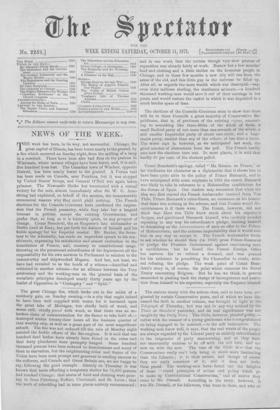The great Chicago fire, which broke out in the midst
of a southerly gale, on Sunday evening,—in a city that ought indeed to have been well supplied with water, for it bordered upon the great lake of Michigan, but chiefly built of wood, and worse still, chiefly paved with wood, so that there was an un- broken chain of communication for the flames to take hold of,— destroyed within twenty-four hours all the business quarter of that wealthy city, as well as a great part of its most magnificent suburb. The fire was not reduced till the rain of Monday night assisted the feeble efforts of the fire-engines. It is said that one hundred dead bodies have already been found in the ruins and that forty plunderers were promptly hanged. Some hundred thousand persons have been reduced to homelessness and many of them to starvation, but the neighbouring cities and States of the Union have been most prompt and generous in sending succour to the sufferers, and Canada and Great Britain are, we are happy to say, following the good example. Already on Thursday it was known that tents affording a temporary shelter for 75,000 persons had reached Chicago; that stores of food and clothing were pour- ing in from l'ittsburg, Buffalo, Cincinnati, and St. Louis ; that the work of rebuilding had in some places actively recommenced ; and in one word, that the certain though very slow process of reparation was already fairly at work. Bestow but a few months' food and clothing and a little shelter on the houseless people in Chicago, and in these few months a new city will rise from the ashes of the old, and this little gap in the universe be filled up. After all, as regards the mere wealth which was destroyed,—say, even sixty millions sterling, the maximum estimate,--'a hundred thousand working-men would save it out of their earnings in ten years, and would restore the casket in which it was deposited in a much briefer space of time.


































